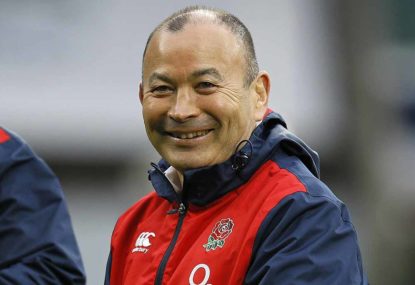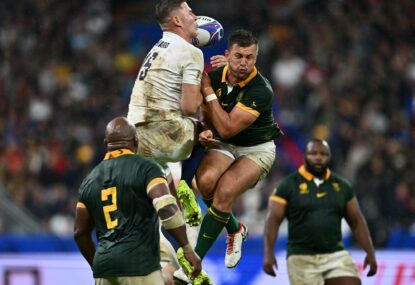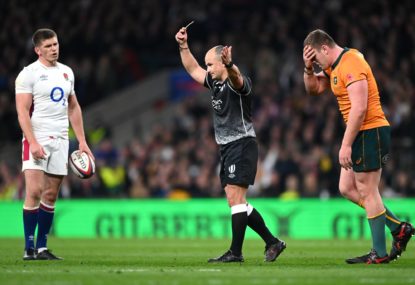Australia have lost the series and only now do they realise what they face – a strong and confrontational England side who are intent on completing a series shut-out.
It would be tempting to slam Australia but that would be unfair, they are still a good team, they still have world-class players and players who have the potential to be world class, they have a captain who is learning and a coach who is one of the best in the world.
Yet, despite these positives, they have some glaring issues that need to be addressed before they can expect to experience an extended period of quality results.
In future Test matches, starting with the one on Saturday, Stephen Moore and his teammates have to be build a better relationship with the referee and if they only learn one thing from this series, it should be how to not alienate the man in control.
One of the best things about modern TV coverage is that we, the spectator, can hear the referee and the instructions he gives to the players throughout the game – this is especially significant when it comes to the breakdown.
During this series Chris Robshaw and James Haskell have been excellent at listening to Romain Poite and Craig Joubert and adapting their behaviour to suit the referees own idiosyncratic interpretation of the breakdown. Consequently, England’s previously poor discipline record has improved tremendously.
This improvement has made a mockery of the notion that players are ‘unlucky’ when it comes to poor discipline or lopsided penalty counts – it has, instead, made it abundantly clear that professional players know the rules and it’s their choice as to whether they give away the penalty or not.
In this series Australia have been naïve in this respect and Scott Fardy has been one of the worst offenders, consistently slowing possession and finding himself on the wrong side of the contact area.
This wouldn’t necessarily be a bad thing if he listened to the referee’s warnings but we frequently hear on the referee’s mic ‘it’s lost’ or ‘give it up gold’ and yet the player does not release the player/ball or show any indication that he has heard the referee.
It’s not clever slowing the ball down or collapsing a maul – it’s clever doing these things and not being penalised. Fardy and several other Australian players must learn this and if they are unwilling then their teammates must help.
Saracens have been exceptionally good this year at telling each other what the referee is saying and this practice appears to have carried over to the national side.
What makes this situation even more frustrating for Australia is that this error has then been frequently compounded by Stephen Moore running up to the referee after every stoppage with a shopping list of things he thinks the referee is doing wrong.
I can’t think of a quicker way to alienate the man with the whistle than constantly whingeing, and Nigel Owens will be less than impressed if this continues on Saturday.
Standing in stark contrast has been Dylan Hartley’s performances as captain, which is especially surprising considering what he once called Wayne Barnes in a Premiership final.
This series has seen him instead build a rapport with the referees, he almost always agrees with their decision and only sometimes suggests one or two aspects of the game he’s struggling with.
It is, therefore, understandable that the referee has responded more favourably to the men in white, often because England are the only ones listening to him.
Anyway, this aspect of the game is frustrating to watch and even more so to talk about because I want the referee to be someone I can ignore, but if the players keep being this thick-headed then they can only blame themselves.
I’m not even going to talk about the scrum, what a shambles the second Test was. I do have one suggestion though, considering my continued gripe that it’s the players’ responsibility to sort out the scrums rather than the referee – prop forwards should be fined their match fee for too many collapsed scrums in a game. And what I mean by collapsed scrums is the front row going down before or as the ball enters the tunnel. Done.
Now onto things that actually have a chance of improving – the Australian pack is too light, which means it’s too easy for the English forwards to tackle for 80 minutes. Sean McManhon was a mistake at No.8 and Australia now need to inject some weight into the contact area in order to make England physically pay for playing the defensive game they seem intent on using.
Ideally, Australia need to find an Owen Finegan and get him charging up the middle – one man out from the ruck or running the decoy line – whatever it takes to commit Maro Itoje, George Kruis, Chris Robshaw, and Billy Vunipola in the middle of the field so that Israel Folau and the other wide men can have some space.
Australia have also been guilty of making lazy assumptions. In the last Test they seemed to assume England would again employ the rush defence ad-nauseam and they would again be rewarded with oceans of space on the wings.
When this didn’t happen there was no plan B, no kicking option for territory, no change of pace or direction and no weight from the forwards in the middle of the field. Folau is a great player but even he needs a little space and momentum in order to score.
Instead, what they encountered was a Paul Gustard defence that employed their grey-cells and varied their style of defence, balancing the drift with the rush while always applying pressure, in turn they forced Australia too wide too soon in the phase count, which was something I warned against last week.
It’s a cliché but you have to earn the right to go wide and Australia didn’t even try. However, it’s easy me saying this, it’s a different matter entirely trying unearth and nurture another Owen Finegan who can rampage down the middle of the field at apparent will.
Conversely, this aspect of the game highlights how good England were at adapting their defensive structures to the situation. It helped that plan A – kick for territory, give Australia the ball and tackle like Trojans – worked like a charm.
Jones has created a team that now thinks on its feet, adapts to the challenges it faces and he has a group of players, led by Chris Robshaw and James Haskell, who are surpassing their potential. This change was epitomised by each English defender making the right decision and maintaining their discipline throughout that epic 22 phase standoff at the end of the first half.
Other commentators, when talking about this part of the game, have referenced the 2003 England 13-man defence in Wellington against New Zealand, but that was a team at the height of their powers and I feel this England can still get better.
Another similarity to 2003 has concerned the English celebrations after the game, which have been contained and a little muted. This has hinted at a deeper mental fortitude that’s driving the red rose in this series and suggests they’re not just aiming for the win but they’re aiming for something more.
And it is this mentality that makes it so hard to predict this third Test.
Normal logic and history would suggest England would now switch to holiday mode and Australia, like the proud host, would in turn assert their rightful dominance and quality by crushing, or at least denting, the so-far-so-lucky upstart in the final game.
But this England team does not look like they’re going on holiday yet.
With this in mind and making the assumption that England will turn up and play, Australia need to create space out-wide for their destructive runners if they are to win.
They can do this by varying their game more effectively – push England back into their own half with kicks to the corner, make Ben Youngs use his inconsistent box-kick more often and under greater pressure, actually develop a kick chase that forces Mike Brown to run it back and catch him in possession.
Couple this game plan with a strong running game, get heavy traffic going down the middle of the field, over-power the English forwards, force England to commit more men to the contact area. But most of all Australia must use a variation of tactics that force England to keep adapting.
It might also help to target Maro Itoje and Billy Vunipola – wrestle them to the ground at every breakdown, lineout or contact phase and hold them there. Obviously if the referee spots this tactic then stop it but anything and everything should be done tire the English dynamos out and force Jones to empty his bench earlier in the game.
With the inclusion of Matt Toomua and Will Skelton it’s clear Cheika is trying to support Foley’s kicking game and add weight to the pack. So there is hope for Australia that their tactics this week stretch beyond banging their heads against the English defensive wall.
In response England should aim to pressure Australia through a coordinated kicking game using their excellent 10/12 axis that gives away possession but gains territory.
England then push for the corners, take the punches, turn Australia, take the punches, isolate the attacker, take the punches and then turn over possession or force the penalty – the aim being that the scoreboard is in perpetual motion.
The only difference this week comes with the inclusion of Temaina Harrison, the in-form back row forward from the Aviva Premiership this season, replacing the brilliant James Haskell. This is a loss for England, Haskell has made a huge contribution to the tackle count and this will no doubt effect England’s ability to play the defensive game that won them the second Test.
Harrison is an abrasive and tough forward and how he copes with the physical demands of the Eddie Jones defensive gameplan will be one of the deciding factors of the game.
The ultimate aim of this game-plan is for Australia to start feeling the scoreboard pressure and start running from every position. If this happens England can then unleash their beasts, turn it over and give it to their finishers to strike.
Eddie Jones has again picked a bench for this eventuality. He will again hold his nerve long enough so that when the final ten minutes arrive he will be able to introduce Courtney Lawes, Jamie George, Joe Launchberry and Jack Clifford to win the game against a bruised and exhausted Australian pack. He will hope that England’s fitness will last longer than Australia’s and so far this series, it has.
The Sky pitchside interviewer summed this tactic up nicely by calling it the rugby version of Muhammed Ali’s ‘rope-a-dope’.
This approach would be the safe option for England, but Eddie Jones is a wily operator, and who would bet against England employing a tactic not yet seen in this series?
If Australia do employ a kick chase strategy but kick too long, then England have the runners to punish them. I imagine Jones will predict this move from Cheika and will have planned an appropriate response.
Watson, Nowell and Joseph should be looking to hang on Brown’s shoulder expecting the Australian kick.
Foley and Toomua will have to get their kicks right, this will involve coping with the pressure better than they did last week.
And the chase will have to be flat and quick or else holes will appear, Brown will offload quickly and English speed will come to the fore. If that happens then the nightmare of this series will only get worse for Australia.
After two games the tactics are fairly easy to discern at this stage. It’s the mental side of things that makes this third Test such a coin toss.
Australia looked mentally shot at the end of the last Test – it looked like each time they dropped a ball and lost another scoring opportunity it physically hurt.
That would suggest Australia are done but, for twenty glorious minutes of the first Test, Australia played some of the best rugby anyone has seen in the last five years.
If they could have kept it up for another ten minutes, then this series would now be tied and I’d be backing them to take the series.
In contrast, England should now be celebrating, going to the pub every night and doing all those things that they’ve got in to trouble for in the past but this England team feels like something else, something we haven’t seen since 2003.
At the beginning of this series I thought England would win the first Test, the second would be close but England might prevail and the third Test would belong to a home team looking to assert themselves.
Now, I don’t know. My gut tells me not to write the Aussie team off, but this has less to do with the actual team and more to do with how historically hard it is to achieve a three match shut-out away from home.
In contrast, my head tells me Jones is still a step ahead of Cheika and if Australia are as inaccurate with their kick-chase this week as they were with their passing last week then this will be 3-nil to the men in white.




































































































